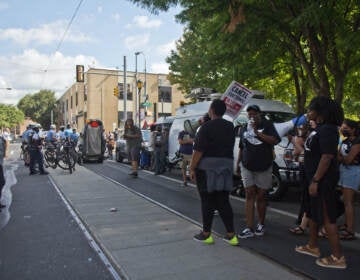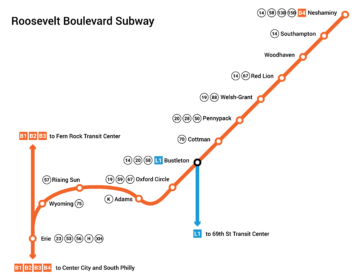Is your property tax bill going up? Philadelphia has finally started mailing out assessments
The figures will likely cause some sticker shock. After a three-year pause in assessments, residential property values increased by an average of 31%.

Shown are rowhouses in Philadelphia, Friday, April 8, 2022. (AP Photo/Matt Rourke)
After months of uncertainty, Philadelphia has finally begun mailing new property assessments to thousands of homeowners. Residents will also receive the forms needed to dispute the valuations.
The figures, which dictate individual property taxes, will likely cause some sticker shock. After a three-year pause in assessments, residential property values increased by an average of 31%.
Nearly a quarter of all single-family homes in the city saw assessed values shoot up more than 50%, according to a review conducted by the City Controller’s Office.
“Some people are seeing their tax bills double or triple,” said Kate Dugan, a staff attorney in the homeownership unit at the nonprofit Community Legal Services.
The Office of Property Assessment posted the new values online in May, but it was unclear exactly when homeowners, some without a personal computer or internet access, would receive the official notice in the mail. City officials said there’d be a delay because supply chain issues were preventing a vendor from procuring enough envelopes to complete the mailing.
So far, the city has mailed assessment notices to nearly 200,000 property owners, said spokesperson Kevin Lessard. The majority of the notices, which went out on Friday, were for commercial properties.
The rest of the notices — some 350,000 of them — will be mailed in the coming days, said Lessard.
Property owners who want to dispute their new assessments have two options. Residents can pursue both avenues. Neither require an attorney.
Option 1: Residents can informally appeal their new property value by requesting that OPA conduct what’s known as a “First Level Review.” The form to get assessors to take a second look is included with the assessment notices..
The deadline to request an FLR is Sept. 30.
Option 2: Property owners can also file a formal appeal of their new assessment with the city’s Board of Revision of Taxes. The deadline, set by the state, is Oct. 3.
Officials are estimating up to 20% of property owners will appeal their new assessments.
“They’re always welcome to call us for help thinking through what relief they might qualify for if their assessment is not something that they want to appeal,” said Dugan, of CLS.
Alternatively, the city has existing programs designed to offset the financial impact of property assessments.
Under the budget deal reached in June between City Council and Mayor Jim Kenney’s administration, residents can apply to have $80,000 deducted from their property value, which could lower their property tax bill by about $1,119 each year. The Homestead Exemption was $45,000, which saved homeowners about $629 annually.
A pair of new city laws change the eligibility requirements for the Longtime Owner Occupants Program and the Senior Citizen Real Estate Tax Freeze program.
LOOP is designed to protect low-to-moderate income homeowners from being displaced from swiftly gentrifying neighborhoods. Under the new measure, the value of the homestead exemption is no longer part of the equation for determining eligibility. Homeowners can now have their property value capped as long as their assessment went up by at least 50% in one tax year. The revamped program also enables homeowners to participate if their property value increased by at least 75% over the course of five tax years.
A separate bill allows homeowners to retroactively enroll in the senior freeze program, which is generally for residents who are 65 and older.
Property tax bills are typically sent out in December and due at the end of the following March.
 WHYY is one of over 20 news organizations producing Broke in Philly, a collaborative reporting project on solutions to poverty and the city’s push towards economic justice. Follow us at @BrokeInPhilly.
WHYY is one of over 20 news organizations producing Broke in Philly, a collaborative reporting project on solutions to poverty and the city’s push towards economic justice. Follow us at @BrokeInPhilly. 
Subscribe to PlanPhilly
WHYY is your source for fact-based, in-depth journalism and information. As a nonprofit organization, we rely on financial support from readers like you. Please give today.









